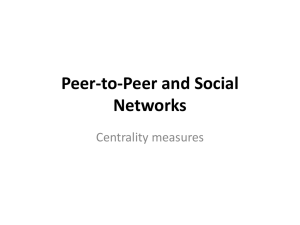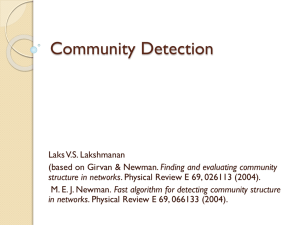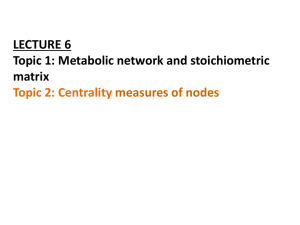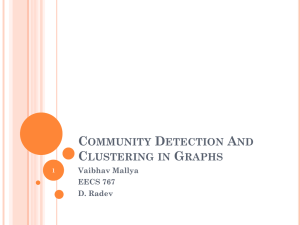Random Walk Centrality
advertisement
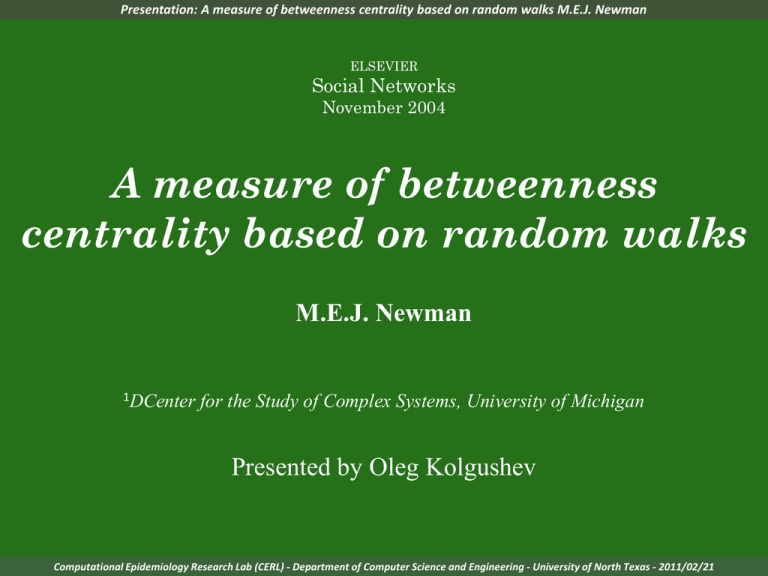
Presentation: A measure of betweenness centrality based on random walks M.E.J. Newman ELSEVIER Social Networks November 2004 A measure of betweenness centrality based on random walks M.E.J. Newman 1DCenter for the Study of Complex Systems, University of Michigan Presented by Oleg Kolgushev Computational Epidemiology Research Lab (CERL) - Department of Computer Science and Engineering - University of North Texas - 2011/02/21 Presentation: A measure of betweenness centrality based on random walks M.E.J. Newman Contents • Introduction to Centrality of a graph node • Random walk betweenness – A current flow analogy – Calculation of betweenness in random walks • Examples and applications – Simple graph example – Correlation with other measures – Example applications • Conclusion and future work Computational Epidemiology Research Lab (CERL) - Department of Computer Science and Engineering - University of North Texas - 2011/02/21 Presentation: A measure of betweenness centrality based on random walks M.E.J. Newman Centrality measures • Importance of vertices in a graph – Roles played by people on social network – Communication stability of a network – Epidemiological application, etc. • Degree (number of edges on a node) • Closeness Vertices A and B have high (shortest-path) betweenness in this configuration, while vertex C does not. • Betweenness – Shortest-path betweenness – Flow betweenness – Random walk betweenness • Power centrality • Random walk centrality • Information centrality • In calculations of flow betweenness, vertices A and B in this configuration get high scores while vertex C not. Computational Epidemiology Research Lab (CERL) - Department of Computer Science and Engineering - University of North Texas - 2011/02/21 Presentation: A measure of betweenness centrality based on random walks M.E.J. Newman Random Walk Betweenness • Current flow analogy Computational Epidemiology Research Lab (CERL) - Department of Computer Science and Engineering - University of North Texas - 2011/02/21 Presentation: A measure of betweenness centrality based on random walks M.E.J. Newman Simple Graph Examples Computational Epidemiology Research Lab (CERL) - Department of Computer Science and Engineering - University of North Texas - 2011/02/21 Presentation: A measure of betweenness centrality based on random walks M.E.J. Newman Network Examples The network of intermarriage relations between the 15th century Florentine families studied by Padgett and Ansell (1993) Computational Epidemiology Research Lab (CERL) - Department of Computer Science and Engineering - University of North Texas - 2011/02/21 Presentation: A measure of betweenness centrality based on random walks M.E.J. Newman Applications The largest network component of a sexual contacts of high-risk actors in Colorado Springs, CO (Potterat et al. 2002). The size of the vertices indicates their random walk betweenness. The pointed shaded vertices are those for which the random-walk betweenness is much greater than shortest-path betweenness (twice or more). Scatter plots of the random-walk betweenness of vertices in the network above against vertex degree (left) and standard shortest-path betweenness (right). The dotted lines indicate the best linear fits in each case, which have the correlation coefficients indicated. Computational Epidemiology Research Lab (CERL) - Department of Computer Science and Engineering - University of North Texas - 2011/02/21 Presentation: A measure of betweenness centrality based on random walks M.E.J. Newman Applications The largest component of the co-authorship network of scientists working on networks from Newman and Park (2003). Size of vertices represents their random-walk betweenness measure. Vertices on a single path from one part of the network to another (labeled “A”) get a high score. So, do those labeled “B” however, even though they lie on one of several paths between different parts of the network. Computational Epidemiology Research Lab (CERL) - Department of Computer Science and Engineering - University of North Texas - 2011/02/21 Presentation: A measure of betweenness centrality based on random walks M.E.J. Newman Conclusions • The measure of betweenness based on random walks counts all paths between vertices and makes no assumptions of optimality • It can be calculated using matrix inversion in O(n3) • It correlates to other measures of centrality and gives more realistic scores to vertices in mentioned applications • Conclusion and future work Computational Epidemiology Research Lab (CERL) - Department of Computer Science and Engineering - University of North Texas - 2011/02/21
